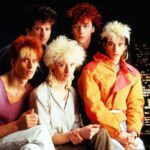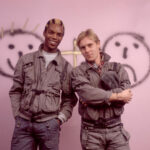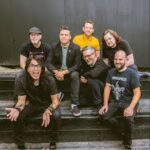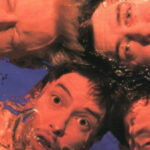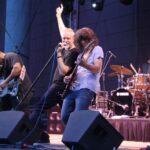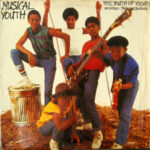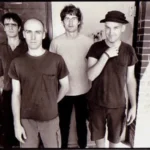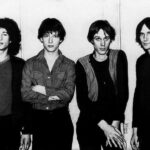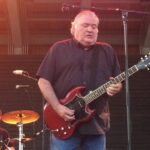 Los Lobos’ cover of Bertha, originally a Grateful Dead classic, is a remarkable fusion of two iconic American bands that, while distinct in their stylistic approaches, share deep roots in folk, rock, and improvisational music. Their interpretation of Bertha showcases Los Lobos’ unique ability to reimagine a song while maintaining the spirit of the original. This article will explore the history of Bertha, its place in the Grateful Dead catalog, Los Lobos’ approach to the song, and its significance within both bands’ legacies.
Los Lobos’ cover of Bertha, originally a Grateful Dead classic, is a remarkable fusion of two iconic American bands that, while distinct in their stylistic approaches, share deep roots in folk, rock, and improvisational music. Their interpretation of Bertha showcases Los Lobos’ unique ability to reimagine a song while maintaining the spirit of the original. This article will explore the history of Bertha, its place in the Grateful Dead catalog, Los Lobos’ approach to the song, and its significance within both bands’ legacies.
Origins of “Bertha”
Bertha was first introduced to the world by the Grateful Dead in 1971, appearing as the opening track on their self-titled album, also known as Skull & Roses. Written by Jerry Garcia and Robert Hunter, the song quickly became a staple of the Dead’s live performances, capturing the band’s signature blend of folk, rock, and psychedelic influences.
Lyrically, Bertha is filled with Hunter’s characteristic wordplay and allegorical storytelling. While the song might initially seem to be about a woman named Bertha, many interpretations suggest it’s actually about running from fate or the unpredictability of life itself. Hunter once suggested that the song was inspired by a malfunctioning fan at the Dead’s office, reinforcing the idea that the song is more about movement and escape rather than a literal character.
Musically, Bertha exemplifies the Dead’s effortless groove, with Garcia’s bright, melodic guitar work leading the charge. The rhythm section—Phil Lesh’s fluid bass lines and Bill Kreutzmann’s dynamic drumming—keeps the song moving, while Bob Weir’s rhythm guitar adds texture and depth. The song’s energy made it a perfect show opener, and it remained a fan favorite throughout the Dead’s career.
Los Lobos: Background and Musical Influence
Los Lobos, formed in East Los Angeles in the early 1970s, emerged as one of the most eclectic and innovative bands in American rock. Blending rock and roll with traditional Mexican folk, blues, soul, and country, Los Lobos carved out a unique identity that resonated with a wide audience. The band’s breakthrough came with their 1984 album How Will the Wolf Survive?, which showcased their ability to merge roots music with a contemporary edge.
Like the Grateful Dead, Los Lobos has always been known for their musical versatility and improvisational spirit. Their deep respect for musical traditions and their willingness to experiment made them a natural fit for interpreting songs outside their own catalog. Their ability to take a well-known song and infuse it with their signature sound is part of what makes their cover of Bertha so compelling.
Los Lobos’ Interpretation of “Bertha”
Los Lobos recorded their version of Bertha for the 1991 tribute album Deadicated, which featured various artists covering Grateful Dead songs. Their rendition stands out as one of the most energetic and engaging on the album, capturing the song’s essence while giving it a distinct Los Lobos flavor.
Musical Elements
Los Lobos’ version of Bertha is driven by their signature tight, rhythmic approach. The song maintains the upbeat, rolling groove of the original but adds a slightly rougher, grittier edge. David Hidalgo’s lead vocals bring a soulful urgency to the track, differing from Garcia’s more laid-back delivery.
Cesar Rosas’ guitar work, combined with Hidalgo’s, creates a raw, blues-infused sound, emphasizing the song’s rhythmic drive. The band’s rhythm section—Conrad Lozano on bass and Louie Pérez on drums—locks into a deep groove, ensuring the track has both the swing and propulsion necessary to keep it moving. Steve Berlin’s saxophone work, an element not present in the original, adds a new layer of texture, highlighting the song’s celebratory and freewheeling nature.
Differences from the Grateful Dead Version
While the Grateful Dead’s version of Bertha is loose and jam-oriented, Los Lobos’ take is more compact and direct. The Dead’s live renditions often featured extended solos and improvisational sections, whereas Los Lobos kept their version tight and punchy, leaning into their rock and blues influences. This difference in approach speaks to each band’s strengths: the Dead’s love for improvisation versus Los Lobos’ deep-rooted, groove-centric rock.
One of the most notable elements in Los Lobos’ version is the sheer energy they bring to the song. The faster tempo and grittier production give Bertha a more immediate, almost urgent feel, while still preserving the song’s inherent joy and movement.
Impact and Legacy
Los Lobos’ cover of Bertha received praise for its fresh take on a Grateful Dead classic. Their version introduced the song to audiences who may not have been deeply familiar with the Dead’s work, showcasing the strength of the songwriting beyond its original context. Additionally, Deadicated as a whole played a role in broadening the Dead’s influence, exposing their catalog to fans of artists like Los Lobos, Elvis Costello, and Jane’s Addiction.
For Los Lobos, their participation in Deadicated reaffirmed their place in the pantheon of American roots music. It was a testament to their ability to interpret and honor classic material while making it entirely their own.
Within the larger scope of Los Lobos’ career, Bertha remains an example of their adaptability and respect for musical history. They have continued to perform covers of iconic songs throughout their career, always adding their own distinct touch while staying true to the spirit of the original.
The Shared Spirit of Los Lobos and the Grateful Dead
At first glance, the Grateful Dead and Los Lobos may seem like very different bands—one associated with psychedelic rock and extended improvisation, the other rooted in Chicano rock and traditional folk. However, they share many musical and philosophical commonalities:
- Eclectic Influences: Both bands draw from a vast array of musical traditions. The Dead incorporated folk, country, jazz, and blues, while Los Lobos blended rock with Mexican folk, R&B, and blues.
- Commitment to Live Performance: Both groups are known for their dynamic, ever-evolving live shows. Just as the Dead built their legacy through constant touring and improvisation, Los Lobos have maintained a reputation as a powerhouse live act.
- Musical Storytelling: Robert Hunter’s lyrics for the Dead often told poetic, allegorical stories, while Los Lobos’ songwriting captures vivid narratives of life, love, and struggle, often with a strong sense of cultural identity.
Given these shared qualities, it’s no surprise that Los Lobos’ rendition of Bertha feels so natural. Their version isn’t just a cover—it’s a reinterpretation that highlights the enduring power of great songwriting and cross-genre influence.
Conclusion
Los Lobos’ cover of Bertha is a shining example of how a great song can transcend genres and generations. By infusing the Grateful Dead classic with their own brand of rock, blues, and roots music, Los Lobos honored the original while making it unmistakably their own. Their version captures the song’s sense of motion and escape, breathing new life into a track that was already deeply beloved by Deadheads.
For both longtime fans of the Grateful Dead and newcomers discovering Bertha through Los Lobos, this cover serves as a bridge between two iconic American bands—each dedicated to musical exploration, storytelling, and keeping traditions alive in their own way.
This post has already been read 21 times!
